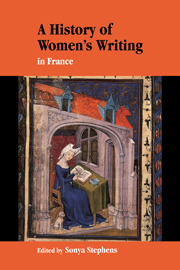Book contents
- Frontmatter
- Contents
- Notes on contributors
- Introduction
- 1 Female voices in convents, courts and households: the French Middle Ages
- 2 To choose ink and pen: French Renaissance women's writing
- 3 Altering the fabric of history: women's participation in the classical age
- 4 The eighteenth century: women writing, women learning
- 5 Eighteenth-century women novelists: genre and gender
- 6 The nineteenth century: shaping women
- 7 1900–1969: writing the void
- 8 From order to adventure: women's fiction since 1970
- 9 Changing the script: women writers and the rise of autobiography
- 10 Women poets of the twentieth century
- 11 Voicing the feminine: French women playwrights of the twentieth century
- 12 Feminist literary theory
- Bibliographies
- Index
8 - From order to adventure: women's fiction since 1970
Published online by Cambridge University Press: 25 September 2009
- Frontmatter
- Contents
- Notes on contributors
- Introduction
- 1 Female voices in convents, courts and households: the French Middle Ages
- 2 To choose ink and pen: French Renaissance women's writing
- 3 Altering the fabric of history: women's participation in the classical age
- 4 The eighteenth century: women writing, women learning
- 5 Eighteenth-century women novelists: genre and gender
- 6 The nineteenth century: shaping women
- 7 1900–1969: writing the void
- 8 From order to adventure: women's fiction since 1970
- 9 Changing the script: women writers and the rise of autobiography
- 10 Women poets of the twentieth century
- 11 Voicing the feminine: French women playwrights of the twentieth century
- 12 Feminist literary theory
- Bibliographies
- Index
Summary
Impossible de définir une pratique féminine de l'écriture, d'une impossibilité qui se maintiendra car on ne pourra jamais théoriser cette pratique, l'enfermer, la coder, ce qui ne signifie pas qu'elle n'existe pas. Mais elle excédera toujours le discours que régit le système phallocentrique; elle a et aura lieu ailleurs que dans les territoires subordonnés à la domination philosophique–théorique.
A female practice of writing can't be defined, and this impossibility will not go away. No-one will ever be able to theorize this practice, enclose it or codify it, which doesn't mean it doesn't exist. But it will always exceed the discourse of the phallocentric system; it takes place, and will continue to take place, elsewhere than in those territories subject to philosophical–theoretical control.
Hélène Cixous, ‘Le Rire de la Méduse’The early 1970s in France were witness to a complex series of deepseated historical changes. In the political and social sphere, the events of May 1968, together with de Gaulle's resignation from the presidency which followed a year later, marked the end of what was felt by many in France, despite the substantial economic changes that came in its wake, to be an often backward-looking era of paternalistic and autocratic rule, and which had found its most telling embodiment in the self-mythologizing persona of General de Gaulle himself.
- Type
- Chapter
- Information
- A History of Women's Writing in France , pp. 168 - 184Publisher: Cambridge University PressPrint publication year: 2000



